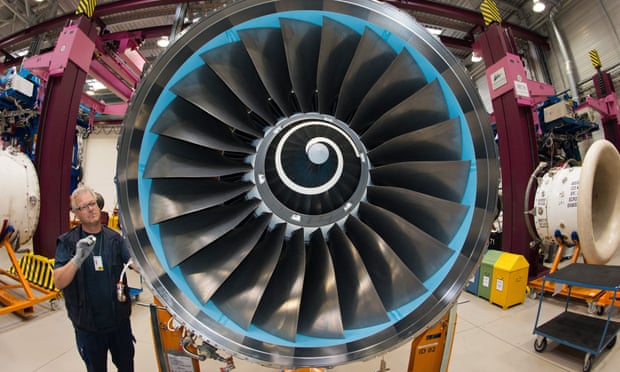Rolls-Royce wins Norwegian's aircraft engine order
Feb 02, 2016
Dreamliner deal provides lift for struggling firm two weeks before annual results

Rolls-Royce has won a significant boost after budget airline Norwegian agreed a $2.7bn (£1.9bn) deal to buy engines from the beleaguered company.
Rolls will provide Trent 1000 engines for 19 Boeing 787 Dreamliner aircraft that Norwegian has ordered.
The order is the firm’s biggest since Warren East became chief executive last July.
It comes just less than two weeks before Rolls’s annual results, when East is expected to provide details about his plan to revitalise the struggling company.
Rolls-Royce has issued five profit warnings in less than two years, and its share price has fallen by almost half since last April. The Derby-based group has blamed the profit warnings on a number of factors, including falling demand for corporate jets and the sharp fall in the price of oil, which has hurt customers in the energy industry.
The pressure on the company has been increased by ValueAct, an activist investor based in California, building a 10% holding in Rolls and pushing for a seat on the board. Rolls is also mired in a Serious Fraud Office investigation about bribery allegations in China, Indonesia and other parts of the world.
Shares in Rolls were flat at 555p after the Norwegian deal was announced. Rolls will also service Norwegian’s engines as part of the agreement.
Eric Schulz, president of civil aerospace at Rolls, said: “This is another significant decision in favour of the Trent 1000, an engine that delivers exceptional economics and performance.”
Rolls is competing with US rival General Electric to provide engines for the 787 Dreamliner, which went into service in 2011.
Bjørn Kjos, chief executive of Norwegian, said: “This decision further develops our relationship with Rolls-Royce and we look forward to operating aircraft powered by the latest version of the Trent 1000, which sets new standards of performance.”
Analysts said the deal highlighted the strength of Rolls in the wide-bodied market, which includes planes that typically hold 250 people or more and focus on long-haul travel.
Andy Chambers, analyst at Edison Investment Research, said: “This follows hot on the heels of last week’s announcement by Airbus that Iran intends to order 73 wide-body aircraft, including 18 A330-900neos and 16 A350-1000s powered by Rolls-Royce Trent engines.
“With the potential to power the 12 A380s and 27 A330ceos also selected, [the Iran order] could turn out to be one of Rolls-Royce’s most significant orders.
“Both developments continue to highlight Rolls-Royce’s strong market position in the wide-body market, with the Iran selection a major support for the A330 and A380 programmes.”
Despite its problems, Rolls is on course to claim a 50% share of the wide-bodied market by 2020, up from 30% at present.
However, orders for wide-bodied aircraft have slowed, while the narrow-bodied market is booming thanks to the demand for the A320neo and the Boeing 737 Max.
Rolls pulled out of the narrow-bodied market in order to focus on larger planes. This has hurt the company’s sales volumes, leaving its factories short of work.
East is attempting to cut costs by up to £200m a year to get the company back on track. This includes as shakeup of the senior management team.
The level of concern about the future of Rolls was underlined in December when it emerged the government has drawn up contingency plans to nationalise its nuclear submarine business or force it to merge with defence manufacturer BAE Systems in the event the company’s performance worsens.
Source: The Guardian